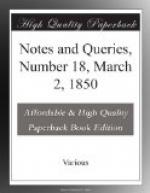V.
Belgravia, Feb. 18, 1850.
What are Depinges?—In the orders made in 1574 for regulating the fishery at Yarmouth, the Dutch settlers there are “To provide themselves with twine and depinges in foreign places.” What are Depinges?
J.S.B.
* * * * *
REPLIES
ORIGIN OF THE JEWS-HARP.
The “Jews-harp,” or “Jews-trump,” is said by several authors to derive its name from the nation of the Jews, and is vulgarly believed to be one of their instruments of music. Dr. Littleton renders Jews-trump by Sistrum Judaicum. But no such musical intrument is spoken of by any of the old authors that treat of the Jewish music. In fact, the Jews-harp is a mere boy’s plaything, and incapable of in itself of being joined either with a voice or any other instrument; and its present orthography is nothing more than a corruption of the French Jeu-trompe, literally, a toy trumpet. It is called jeu-trompe by Bacon, Jew-trump by Beaumont and Fletcher, and Jews-harp by Hackluyt. In a rare black-letter volume, entitled Newes from Scotland, 1591, there is a curious story of one Geilles Duncan, a noted performer on the “Jews-harp,” whose performance seems not only to have met with the approval of a numerous audience of witches, but to have been repeated in the presence of royalty, and by command of no less a personage than the “Scottish Solomon,” king James VI. Agnes Sampson being brought before the king’s majesty and his council, confessed that
“Upon the night of All-hallow-even last, shee was accompanied as well with the persons aforesaid, as also with a great many other witches, to the number of two-hundredth; and that all they together went to sea, each one in a riddle or sive, and went into the same very substantially, with flaggons of wine, making merrie, and drinking by the way, in the same riddle or sives, to the Kirk of North Barrick in Lowthian; and that after {278} they had landed, tooke handes on the lande and daunced this reill or short daunce, singing all with one voice,
“’Commer
goe ye before, commer goe ye:
Gif
ye will not goe before, commer let me.’
“At which time, she confessed that this Geilles Duncan (a servant girl) did goe before them, playing this reill or daunce uppon a small trumpe called a Jews-trumpe, until they entred into the Kirk of North Barrick. These confessions made the King in a wonderfull admiration, and sent for the said Geilles Duncan, who upon the like trumpe did play the saide daunce before the Kinge’s Majestie; who in respect of the strangenes of these matters tooke great delight to be present at their examinations.”
It may be as well to mention that in the Belgic or Low Dutch, from whence come many of our toys, a tromp is a rattle for children. Another etymon for Jews-harp is Jaws-harp, because the place where it is played upon is between the jaws. To those who wish to learn more upon the subject, I beg to refer them to Pegge’s Anonymiana; Dauncy’s Ancient Scottish Melodies; and to my edition of Chettle’s Kind-Harts Dream printed by the Percy Society.




